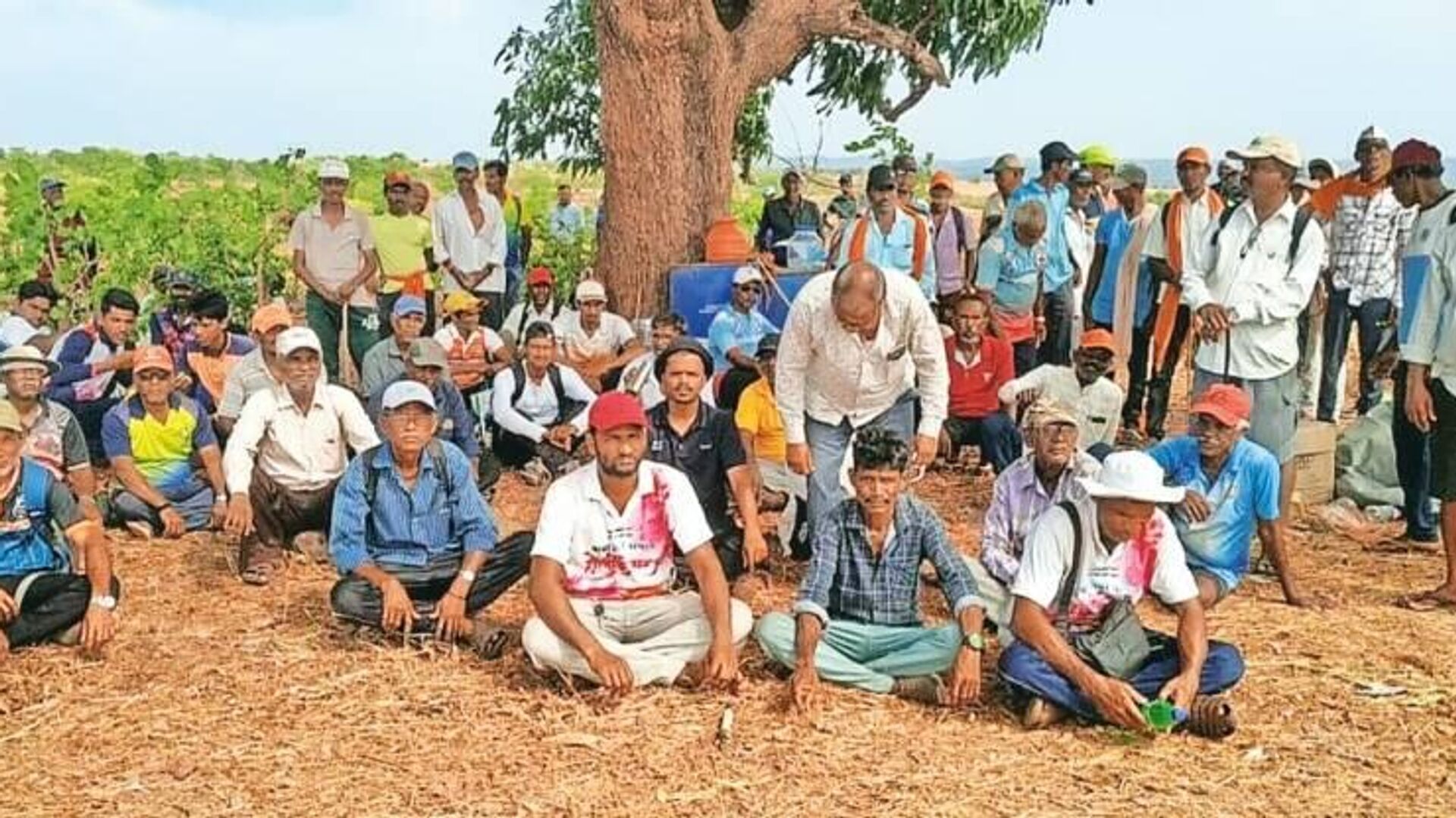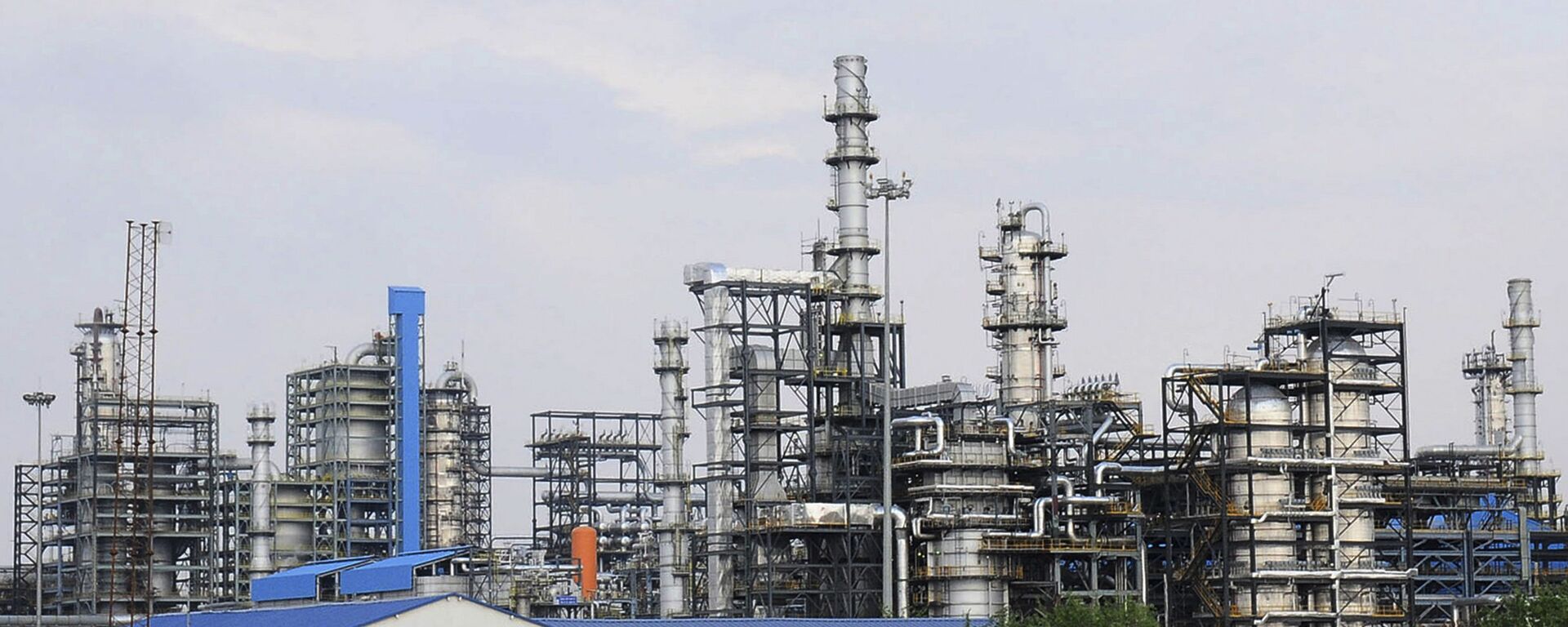https://sputniknews.in/20230427/what-led-to-maharashtra-residents-rallying-against-mega-refinery-project-1712726.html
What Led to Maharashtra Residents Rallying Against Mega Refinery Project
What Led to Maharashtra Residents Rallying Against Mega Refinery Project
Sputnik India
A residents' protest Barsu Refinery in Ratnagiri district of India's Maharashtra state entered its fourth day on Thursday with opposition parties, even a few state government lawmakers, having joined the protestors.
2023-04-27T19:23+0530
2023-04-27T19:23+0530
2023-04-27T19:23+0530
india
maharashtra
environment
indian oil corporation ltd
air pollution
agriculture
indian farmers
unesco
world heritage site
https://cdn1.img.sputniknews.in/img/07e7/04/1b/1725060_5:0:745:416_1920x0_80_0_0_c40704cc6707f96837fa9e898178a05d.jpg
Thursday marked the fourth day that Ratnagiri district residents, in India's Maharashtra state, have been protesting, and they have been joined by opposition parties, and even a few state government lawmakers.Locals from the Barsu and Solgaon villages of the district's Rajapur taluka (division) are demonstrating against a proposed petrochemical refinery project in the area.On Thursday, residents of adjoining eight villages joined the rally.Meanwhile, the state government has also deployed nearly 1,800 police officers.Environmentalists and villagers have been protesting against the proposed refinery for two years. But this week, a protest erupted after government officials carried out a land survey.What Is the Barsu Refinery Project?In 2015, the state government along with the federal government announced plans to set up a $50 billion mega refinery on the west coast of Ratnagiri.The project was supposed to be backed by three major Indian public sector oil companies: Indian Oil Corporation Ltd, Bharat Petroleum Corporation Ltd and Hindustan Petroleum Corporation Ltd. Foreign investments were expected to pour in from Saudi Aramco and Abu Dhabi National Oil Company (ADNOC).At that time, the project site was proposed at Nanar village of Ratnagiri district. However, the site was changed from Nanar to Barsu after villagers, who feared that the refinery would impact traditional livelihoods and lead to environmental degradation, took to the streets in protest.In 2019, Maharashtra Chief Minister Uddhav Thackeray wrote to the federal government suggesting Barsu-Solgaon should be the new site. However, even this proposed site is facing backlash and opposition from archaeologists, environmentalists, and villagers, saying the project might damage ancient rock carvings in the area.The 250 pieces of rock art, or petroglyphs in the village, estimated to be 20,000 years old and classified as protected monuments by the Archaeological Survey of India, have been added to the tentative list of UNESCO's world heritage sites.Furthermore, local villagers are largely dependent on agriculture, given that the area is famous for cultivating Alphonso mangoes. Therefore, the project risked causing pollution and losses to local agriculture.Last year, the Union Ministry of Science and Technology appointed an expert committee to inspect and study the petroglyphs scattered across villages such as Barsu, Rundhe, Devihasol, Devache Gothne, Ukshi, Chave, and Kasheli and propose measures for conserving them.Current State of AffairsAlthough the government is trying to reassure the demonstrators that there will be no environmental loss or degradation because of the proposed refinery, which will function on highly advanced technology and on a green refinery standard, citizens are not satisfied.On Tuesday, police detained 111 people, including women, in Barsu-Solgaon villages as the state government started the land survey process to set up the petrochemical refinery. They were later released on bail by a court.Local media reports confirmed that police had restricted the movement of media and enacted section 144 of the Indian Penal Code, which prevents the gathering of four or more persons in the area.The state government also reached out to the state's veteran leader of the Nationalist Congress Party - Sharad Pawar - who's in the Opposition, to come up with a solution.Pawar said that he told the government they must talk with the villagers opposing the project and find a way out.
https://sputniknews.in/20230425/india-to-build-mongolias-first-oil-refinery-by-2025-1685379.html
india
maharashtra
Sputnik India
feedback.hindi@sputniknews.com
+74956456601
MIA „Rossiya Segodnya“
2023
Deexa Khanduri
https://cdn1.img.sputniknews.in/img/07e6/0c/13/138923_52:0:533:481_100x100_80_0_0_cadf23d341691fc65ff2b22fd1afe584.jpg
Deexa Khanduri
https://cdn1.img.sputniknews.in/img/07e6/0c/13/138923_52:0:533:481_100x100_80_0_0_cadf23d341691fc65ff2b22fd1afe584.jpg
News
en_IN
Sputnik India
feedback.hindi@sputniknews.com
+74956456601
MIA „Rossiya Segodnya“
Sputnik India
feedback.hindi@sputniknews.com
+74956456601
MIA „Rossiya Segodnya“
Deexa Khanduri
https://cdn1.img.sputniknews.in/img/07e6/0c/13/138923_52:0:533:481_100x100_80_0_0_cadf23d341691fc65ff2b22fd1afe584.jpg
ratnagiri district, barsu, solgaon, barsu refinery, barsu refinery project, indian oil corporation ltd, bharat petroleum corporation ltd and hindustan petroleum corporation ltd, saudi arabian oil company, saudi aramco, abu dhabi national oil company, adnoc, traditional livelihoods, environmental degradation, uddhav thackeray, barsu-solgaon, rock art, petroglyphs, archaeological survey of india, unesco's world heritage sites, alphonso mangoes, sharad pawar
ratnagiri district, barsu, solgaon, barsu refinery, barsu refinery project, indian oil corporation ltd, bharat petroleum corporation ltd and hindustan petroleum corporation ltd, saudi arabian oil company, saudi aramco, abu dhabi national oil company, adnoc, traditional livelihoods, environmental degradation, uddhav thackeray, barsu-solgaon, rock art, petroglyphs, archaeological survey of india, unesco's world heritage sites, alphonso mangoes, sharad pawar
What Led to Maharashtra Residents Rallying Against Mega Refinery Project
Deexa Khanduri
Sputnik correspondent
The Indian government, in 2015, announced plans to set up a $50 billion mega refinery on the west coast of the Ratnagiri district of Maharashtra with the backing of state-run oil companies and foreign firms.
Thursday marked the fourth day that Ratnagiri district residents, in India's Maharashtra state, have been protesting, and they have been joined by opposition parties, and even a few state government lawmakers.
Locals from the Barsu and Solgaon villages of the district's Rajapur taluka (division) are demonstrating against a proposed petrochemical refinery project in the area.
On Thursday, residents of adjoining eight villages joined the rally.
Meanwhile, the state government has also deployed nearly 1,800 police officers.
Environmentalists and villagers have been protesting against the proposed refinery for two years. But this week, a protest erupted after government officials carried out a land survey.
What Is the Barsu Refinery Project?
In 2015, the state government along with the federal government announced plans to set up a $50 billion mega refinery on the west coast of Ratnagiri.
The project was supposed to be backed by three major Indian public sector oil companies: Indian Oil Corporation Ltd, Bharat Petroleum Corporation Ltd and Hindustan Petroleum Corporation Ltd. Foreign investments were expected to pour in from Saudi Aramco and Abu Dhabi National Oil Company (ADNOC).
At that time, the project site was proposed at Nanar village of Ratnagiri district. However, the site was changed from Nanar to Barsu after villagers, who feared that the refinery would impact traditional livelihoods and lead to environmental degradation, took to the streets in protest.
In 2019, Maharashtra Chief Minister Uddhav Thackeray wrote to the federal government suggesting Barsu-Solgaon should be the new site. However, even this proposed site is facing backlash and opposition from archaeologists, environmentalists, and villagers, saying the project might damage ancient rock carvings in the area.
The 250 pieces of rock art, or petroglyphs in the village, estimated to be 20,000 years old and classified as protected monuments by the Archaeological Survey of India, have been added to the tentative list of UNESCO's world heritage sites.
Furthermore, local villagers are largely dependent on agriculture, given that the area is famous for cultivating Alphonso mangoes. Therefore, the project risked causing pollution and losses to local agriculture.
Last year, the Union Ministry of Science and Technology appointed an expert committee to inspect and study the petroglyphs scattered across villages such as Barsu, Rundhe, Devihasol, Devache Gothne, Ukshi, Chave, and Kasheli and propose measures for conserving them.
Although the government is trying to reassure the demonstrators that there will be no environmental loss or degradation because of the proposed refinery, which will function on highly advanced technology and on a green refinery standard, citizens are not satisfied.
On Tuesday, police detained 111 people, including women, in Barsu-Solgaon villages as the state government started the land survey process to set up the petrochemical refinery. They were later released on bail by a court.
Local media reports confirmed that police had restricted the movement of media and enacted section 144 of the Indian Penal Code, which prevents the gathering of four or more persons in the area.
The state government also reached out to the state's veteran leader of the Nationalist Congress Party - Sharad Pawar - who's in the Opposition, to come up with a solution.
Pawar said that he told the government they must talk with the villagers opposing the project and find a way out.
"The state chief Eknath Shinde told me that the government was not acquiring any land. It was only testing the soil. I told him to stop the testing until talks are held with the opposing locals. I was told that it had been stopped. I haven't personally checked," said Pawar.



